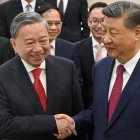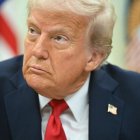China halts strategic exports and rattles global industries after Trump's tariff pressures
Beijing almost completely dominates the global supply of critical materials: it refines 99% of heavy rare earth metals and manufactures 90% of the magnets that use them.

China's President Xi Jinping
A new move by the Chinese regime paralyzes exports of rare earth minerals and magnets critical to strategic industries, raising tension with the United States and raising concerns about the impact on sectors such as automotive, defense and technology.
Since April 4, China has suspended the sale abroad of six heavy rare earth metals - essential materials for manufacturing high-power magnets - and halted the shipment of magnets produced with these elements. These components, refined exclusively in China, are essential for the operation of electric motors in vehicles, drones, robots, satellites and weapons systems. Even internal combustion cars require them for systems such as power steering.
New regulation and geopolitical pressure
The decision comes amid a climate of trade retaliation between China and the United States. Under the new regulatory system Beijing is developing, exports of these materials will require special licenses, a process that industry sources say could take at least 45 days to become fully operational.
During this period of uncertainty, many shipments have been stopped at Chinese ports. Some customs offices allow the departure of magnets with low heavy rare earth content if they are not destined for the US, but others require more rigorous inspections before approving any shipment. This situation has set off alarm bells in global supply chains, especially in U.S. companies that operate with reduced inventories of strategic materials to avoid high costs.
A resource in China's hands
China virtually controls the world's supply of these critical materials: it produces 99% of refined rare earth heavy metals and 90% of the magnets made from them. Although countries such as Japan and Germany have the capacity to manufacture magnets, they remain dependent on China for raw materials. The only alternative refinery, located in Vietnam, has been closed due to tax problems, leaving China in a dominant position.
The metals concerned - such as dysprosium - fetch high prices, fetching more than $200 per kilogram in Shanghai. Their use is essential even in internal combustion vehicles, as these magnets form part of systems such as power steering.
Impact on the defense and automotive industries
Companies such as Tesla and BYD, which rely on advanced magnets from China's JL Mag Rare-Earth, could face disruptions in their production. These magnets have a magnetic strength up to 15 times greater than conventional iron magnets. The strategic importance of this resource was underscored in 2019, when President Xi Jinping personally visited the JL Mag facility, in what was interpreted as a message about China's geopolitical power in this sector.
The U.S. defense sector is one of the most vulnerable. James Litinsky, head of MP Materials - the company that operates the only active rare earth mine in the United States - warned that key technologies for future warfare, such as drones and robotics, depend on these materials whose export is now halted. The company hopes to start producing magnets in Texas later this year to supply manufacturers such as General Motors, but for now its capacity is limited.



























